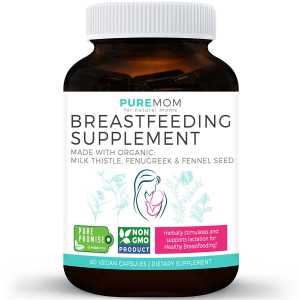Do you think your breast milk supply may be short? Do you want to avoid transitioning to formula but see no other option?
It’s very common for breastfeeding mothers to become concerned about their milk supply at some point. While most women do produce enough milk, a small minority don’t.
Equally some women like the peace of mind of taking a supplement and while they aren’t the solution for everyone, some lactation supplements can potentially make a difference.
Natural Lactation Supplements
How Do Lactation Supplements Work?
If you do think that you may have a low milk supply, it’s first important to rule out other potential issues often associated with a “perceived” low milk supply.
The perception of a low milk supply is often related to issues such as a poor latching on technique, infrequent feeds, a strict feeding schedule or supplementation with formula. In order to establish if there is an issue with your milk supply, you should seek the advice of a lactation consultant.
If you have determined these common issues are not the cause of a low milk supply, then taking a lactation supplement may help you increase your breast milk production and/or lactation.
Lactation supplements often contain some type of substance recognized as a galactagogue. A galactagogue is a food, drug or herb that is able to increase milk production and lactation in mammals.
Two of the most common and well-known dietary supplements that have a reputation for acting as a galactagogue for many women include the herbs Fennel and Fenugreek. Other common herbs found in lactation supplements include Blessed Thistle, Red Raspberry, and Brewers Yeast.
Importantly, only Fenugreek and Fennel are Generally Recognized as Safe (GRAS) by the FDA and so are often the first choice for many women looking for a herbal lactation supplement.
Fenugreek & Fennel: Herbal Lactation Supplements
The exact way in which herbal supplements help to increase milk production remains unclear, yet there are a number of studies that support their effectiveness with regards to milk production and lactation (1).
Fenugreek (Trigonella foenum-graecum L) has been found to be effective at increasing milk supply in a number of studies when compared to placebos (2).
Fennel (Foeniculum vulgare) is another herb often found in lactation supplements, such as herbal tea extracts.
The reputation and history of Fennel as a galactagogue is perhaps not as extensive as Fenugreek. It as also not been as extensively studied as Fenugreek. However, there have been some small studies that show an increase in milk volume, fat content and infant weight gain with Fennel use. Anecdotal support is also widespread (3).
As mentioned earlier, both Fenugreek and Fennel are two herbs that are recognized as GRAS by the FDA and so are definitely two of the better herbal options to try.
When Should You Start Taking Lactation Supplements?
Most women produce enough milk to breastfeed their baby. Although some women do experience a low milk supply, it’s often just a perception that they are not producing and/or lactating adequate amount of milk.
If you think you may be a little insufficient, then you can try a variety of methods to help increase your milk supply, as well as lactation supplements.
The ingredients found in lactation supplements vary tremendously and so the frequency, dosage and best time to begin typically vary too. Therefore, it’s always best to read the supplement label and speak to your doctor and/or lactation consultant for further advice.
For example, some herbs are not advised to be used during pregnancy as they are potential uterine stimulants. This means they could potentially trigger the start of labor.
One such example is the herb Fenugreek is what is referred to as an emmenagogue. An emmenagogue is a substance that can stimulate blood flow to the pelvic region (4).
Therefore, lactation supplements including those containing Fenugreek and Fennel are typically consumed after pregnancy when breastfeeding has started.
Things to Consider When Choosing a Lactation Supplement
Read The Ingredients: New lactation supplements pop up all the time and unfortunately many of these contain new ingredients with little anecdotal or scientific support. Herbal lactation supplements that have been used and for many years and so have a good reputation include those containing Fennel and Fenugreek.
Not only are there plenty of studies to demonstrate their effectiveness to varying degrees, but they are also determined as Generally Recognized as Safe (GRAS) by the FDA.
Consult your Doctor: If you have concerns about your milk supply or breastfeeding in general then it is always best to seek advice from your doctor. They will also be able to give you advice on any lactation supplements or teas you are thinking about taking.
Compare The Brands: While it’s easy to fall for fancy branding, it’s the ingredients they contain that are going to make the difference. Therefore, it’s a good idea to compare the ingredients listed on the label of each supplement.
You will often find that some of the more expensive options are fortified with additional vitamins and minerals. While these won’t provide any increase in milk supply, some people like the idea of combining the two.
Type of Supplement: A lactation supplement doesn’t just have to be in capsule form. So if you are an individual who’s not a fan of swallowing capsules, then there are other options. These include lactation teas and tinctures that contain herbal galactagogues such as Fennel and Fenugreek.
Recommended Lactation Supplements
So which lactation supplement is the best? Here are our top picks based on the ingredients list, brand reputation and reviews.
Best Naturals Fenugreek Seed Capsules
If you want to try a Fenugreek lactation supplement containing no other herbs, Best Naturals offer this jar containing 360 capsules.
The capsules are made from Fenugreek seeds, which is a galactagogue which has been shown in studies to help increase milk supply. It’s also recognized as GRAS by the FDA, which certainly can not be said for all herbal dietary supplements.
The capsules are also free from common allergens including yeast, sodium, wheat, gluten, lactose, egg, corn, starch, and sugar. Therefore, it’s a superb choice for those with sensitivities.
Not only is this company manufacturing its products in the United States, but they are also a supporter of Vitamin Angels. That means they donate a portion of each sale to this charity that’s dedicated to helping supply vitamins to some of the most vulnerable communities.
Mother’s Select Lactation Supplement with Fenugreek
If you like the idea of a supplement containing many different herbs that have been associated with improving milk supply, this supplement by Mothers Select contains some of the most popular.
It includes both Fennel seeds and Fenugreek seeds. These are two of the most studied herbal galactagogues to date, which are also recognized as GRAS.
In addition, the supplement also contains a number of other herbs that have some anecdotal support behind them. This includes both Blessed Thistle and Marshmallow Root.
The Mother’s Secret range is also dairy and gluten-free and made in the USA. Ideal for those who want to support the economy.
On the downside, each bottle only contains 60 capsules.
New Chapter Perfect Postnatal Vitamins & Lactation Supplement
This supplement by New Chapter is a complete solution for mothers looking for a daily postpartum vitamin, lactation supplement and probiotic all in one. That makes it easier and more convenient to get the benefits of potentially many different supplements in a single dose.
With regards to lactation, the supplement contains many different herbs that may support lactation, such as lemon balm, chamomile, lavender, and cardamom.
Each capsule also contains kelp, fish oils and is fortified with Vitamin D3 + B Vitamins to support a healthy, balanced diet. The added probiotic also helps to support good gut health.
While this doesn’t contain the main galactagogues such as Fennel and Fenugreek, it’s certainly a good alternative for those who can’t tolerate these herbs. It’s also GMO-free, certified as organic and vegetarian.
Pure Mom Breastfeeding Supplement
 Pure Mom has been a leading brand in the lactation supplement market for some time. This supplement is one of their most popular among breastfeeding mothers.
Pure Mom has been a leading brand in the lactation supplement market for some time. This supplement is one of their most popular among breastfeeding mothers.
One of the major reasons for their popularity is that the supplement is certified as organic and GMO-free. This is often a must for breastfeeding mothers who want that additional peace of mind that their breast milk is as pure as possible.
The brand also utilizes the most effective herbs used during galactagogue therapy. This includes a combination of Fennel, Fenugreek and the lesser-known herb Milk Thistle.
To top it off, the supplement is vegan-friendly and are made in the United States.
Traditional Medicinals Tea Mothers Milk
If you’re not a fan of swallowing capsules or you like teas, then this herbal tea by Traditional Medicinals claims to help promote healthy lactation.
This herbal lactation tea contains all of the most popular herbs associated with increasing milk supply. This includes herbs such as Fennel, which provides a pleasant licorice taste, as well as Fenugreek.
The tea is certified USDA organic, which may be appealing to mothers who want to avoid artificial flavors, colors, and pesticides while breastfeeding.
Final Words
A low milk supply during breastfeeding is a concern that many mothers experience and in many cases, a herbal lactation supplement can make a real difference. Specifically, those containing the galactagogues Fenugreek and Fennel.
When choosing a dietary supplement containing these herbs consider whether you want one that is combined with a postnatal vitamin. Some also contain probiotics that can help support your digestion.
If for whatever reason you find that you can’t take certain herbs, there are plenty of alternatives, just make sure to check the label. And remember, your milk supply is produced based on supply and demand, so ensure you are regularly breastfeeding and pumping.
References
- https://www.ncbi.nlm.nih.gov/pmc/articles/PMC4436503
- https://espace.curtin.edu.au/handle/20.500.11937/67604
- https://www.ncbi.nlm.nih.gov/books/NBK501793/
- https://www.ncbi.nlm.nih.gov/pmc/articles/PMC4561638/#r30




